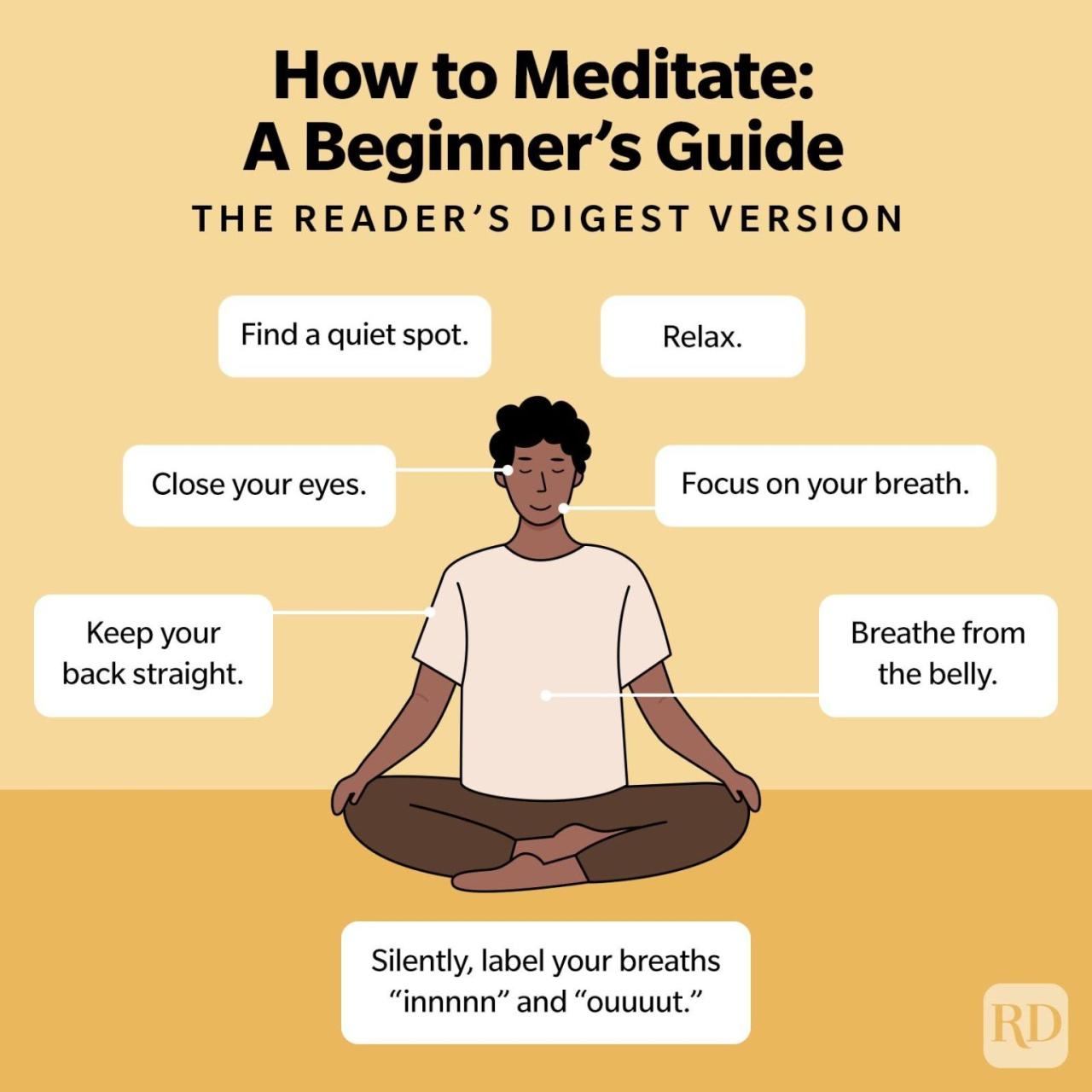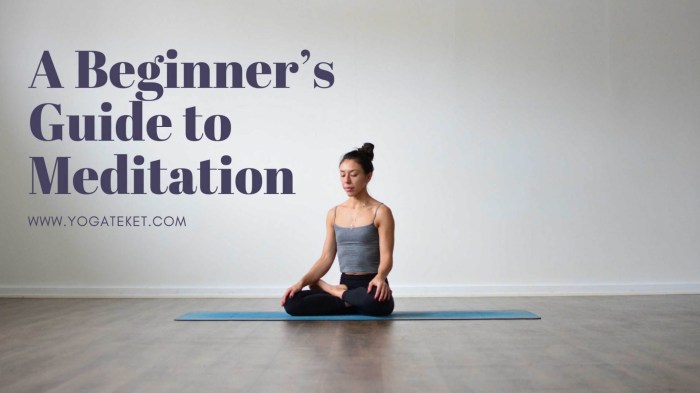Kicking off with Meditation for Beginners, this guide will take you on a journey to explore the world of meditation, helping you find inner peace and well-being. Get ready to dive into the calming waters of mindfulness and relaxation as we uncover the secrets of this ancient practice.
Whether you’re looking to manage stress, improve focus, or simply find a moment of tranquility in your day, meditation has something to offer for everyone, especially beginners taking their first steps into this transformative practice.
Introduction to Meditation for Beginners
Meditation is a practice that involves focusing your mind and eliminating the constant chatter of thoughts. For beginners, meditation can offer numerous benefits such as reducing stress, improving focus and concentration, and promoting emotional well-being.
The Importance of Establishing a Meditation Routine
Creating a consistent meditation routine is crucial for beginners to build a habit and experience the full benefits of the practice. By setting aside dedicated time each day for meditation, beginners can train their minds to be more present and mindful in their daily lives.
How Meditation Can Help Beginners Manage Stress and Improve Overall Well-being
Meditation has been proven to be an effective tool for managing stress and promoting overall well-being. By practicing meditation regularly, beginners can learn to observe their thoughts and emotions without judgment, leading to a greater sense of calm and inner peace.
Types of Meditation Practices

Meditation comes in various forms, each with its unique approach and benefits. Here are some types of meditation practices suitable for beginners, along with their differences and examples of how to incorporate them into your daily routine.
Mindfulness Meditation
- Focuses on being present in the moment
- Involves paying attention to your thoughts and feelings without judgment
- Can be practiced while sitting, walking, or even eating
Guided Meditation, Meditation for Beginners
- Involves following the guidance of a teacher or recorded audio
- Helps beginners stay focused and relaxed
- Can cover various themes like relaxation, stress relief, or self-love
Loving-Kindness Meditation
- Focuses on cultivating love and compassion towards oneself and others
- Involves repeating phrases of goodwill and kindness
- Can help improve relationships and overall well-being
Start by dedicating a few minutes each day to one of these practices. Find a quiet and comfortable space, sit or lie down, and focus on your breath or the guidance provided. As you progress, you can gradually increase the duration of your meditation sessions. Remember, consistency is key in building a meditation routine that works for you.
Setting Up a Meditation Space
Creating a dedicated meditation space at home is essential for beginners to establish a consistent practice. A peaceful and comfortable environment can greatly enhance the meditation experience and promote a sense of calm and focus.
Choosing the Right Space
When setting up a meditation space, it’s crucial to select a quiet area free from distractions and clutter. Choose a spot where you feel relaxed and can easily disconnect from the outside world. This could be a corner of a room, a spare bedroom, or even a cozy nook in your living room.
Decorating Your Space
To enhance your meditation practice, consider decorating your space with elements that promote tranquility and mindfulness. You can add items like candles, essential oils, plants, cushions or a comfortable meditation chair, and soft lighting. Incorporating calming colors such as blues, greens, or neutrals can also contribute to a soothing atmosphere.
Personal Touches
Make your meditation space your own by adding personal touches that resonate with you. This could include meaningful objects, inspirational quotes, or spiritual symbols that hold significance for you. Creating a space that reflects your personality and interests can make your meditation practice more enjoyable and meaningful.
Breathing Techniques for Beginners
Breathing is a fundamental aspect of meditation practice, as it provides a focal point to anchor the mind and bring awareness to the present moment. By focusing on the breath, beginners can cultivate a sense of calm and relaxation, allowing them to let go of distractions and stress.
Simple Breathing Techniques
- 1. Deep Belly Breathing: Find a comfortable seated position with your back straight. Place one hand on your chest and the other on your belly. Inhale deeply through your nose, filling your belly with air and allowing your diaphragm to expand. Exhale slowly through your mouth, feeling your belly contract. Repeat for several breaths, focusing on the sensation of breathing.
- 2. 4-7-8 Breathing: Sit or lie down in a relaxed position. Inhale quietly through your nose for a count of 4. Hold your breath for a count of 7. Exhale slowly and completely through your mouth for a count of 8. Repeat this cycle for a few rounds, allowing yourself to relax with each breath.
- 3. Alternate Nostril Breathing: Sit comfortably with your spine straight. Close your right nostril with your right thumb and inhale deeply through your left nostril. Close your left nostril with your ring finger, release your right nostril, and exhale through the right nostril. Inhale through the right nostril, close it, release the left nostril, and exhale through the left nostril. Repeat for several rounds, focusing on the flow of breath.
Common Challenges Faced by Beginners

Starting a meditation practice can be challenging for beginners due to various obstacles that may arise. It’s important to recognize these common challenges and have strategies in place to overcome them to stay consistent and committed to the meditation journey.
Restlessness and Racing Thoughts
- Beginners often struggle with calming the mind and dealing with racing thoughts during meditation sessions.
- One strategy to overcome this challenge is to focus on the breath and gently bring the attention back whenever the mind starts to wander.
- Practicing mindfulness and observing thoughts without judgment can also help in reducing restlessness and promoting a sense of calm.
Distractions and External Noise
- External distractions such as noise, light, or movement can disrupt the meditation practice for beginners.
- Creating a dedicated meditation space free from distractions can help in minimizing external interferences.
- Using earplugs, eye masks, or playing soothing music can aid in creating a serene environment for meditation.
Lack of Motivation and Consistency
- Beginners may struggle with maintaining motivation and consistency in their meditation practice, especially when not seeing immediate results.
- Setting realistic goals and establishing a daily meditation routine can help in staying committed to the practice.
- Joining a meditation group or finding a meditation buddy for accountability and support can also boost motivation and consistency.
Resources for Beginners: Meditation For Beginners
Looking for resources to help you kickstart your meditation journey? Here are some recommendations to guide you along the way.
Books for Beginners
- “The Miracle of Mindfulness” by Thich Nhat Hanh
- “Wherever You Go, There You Are” by Jon Kabat-Zinn
Apps for Meditation
- Headspace
- Calm
- Insight Timer
Online Resources
- Mindful.org
- UCLA Mindful Awareness Research Center
Guided Meditation Sessions
Looking for guided meditation sessions tailored for beginners? Check out resources like:
- YouTube channels specializing in guided meditations
- Apps like Insight Timer that offer guided sessions
Benefits of Joining Classes or Communities
Joining meditation classes or communities can provide additional support and guidance for beginners. Here are some benefits:
- Access to experienced instructors
- Opportunity to connect with like-minded individuals
- Structured learning environment